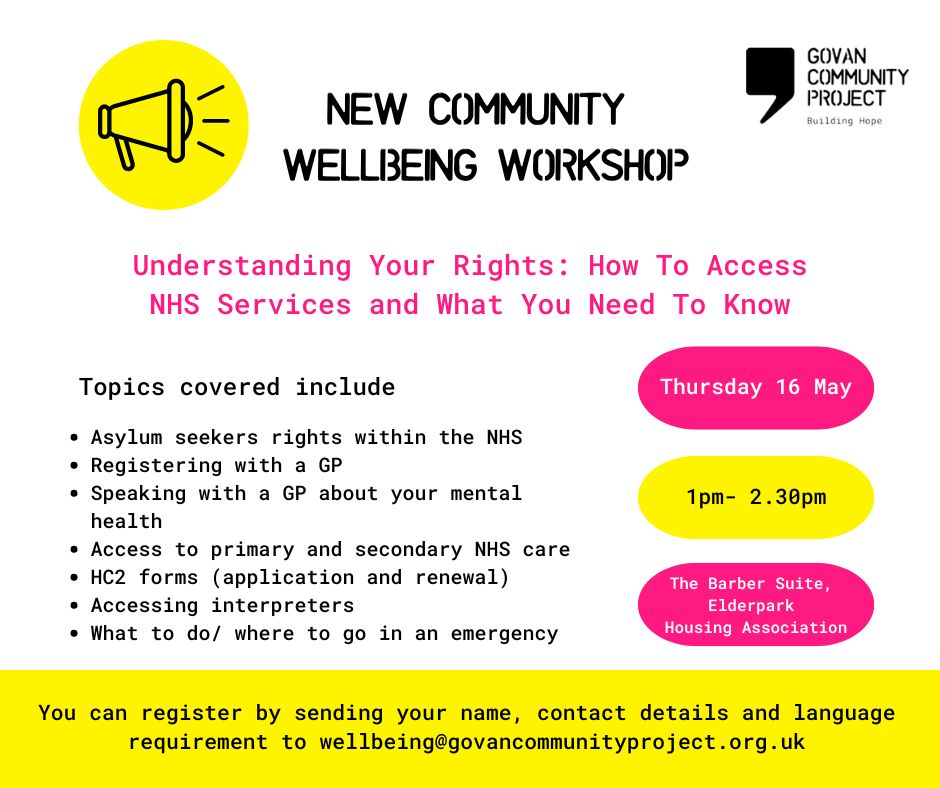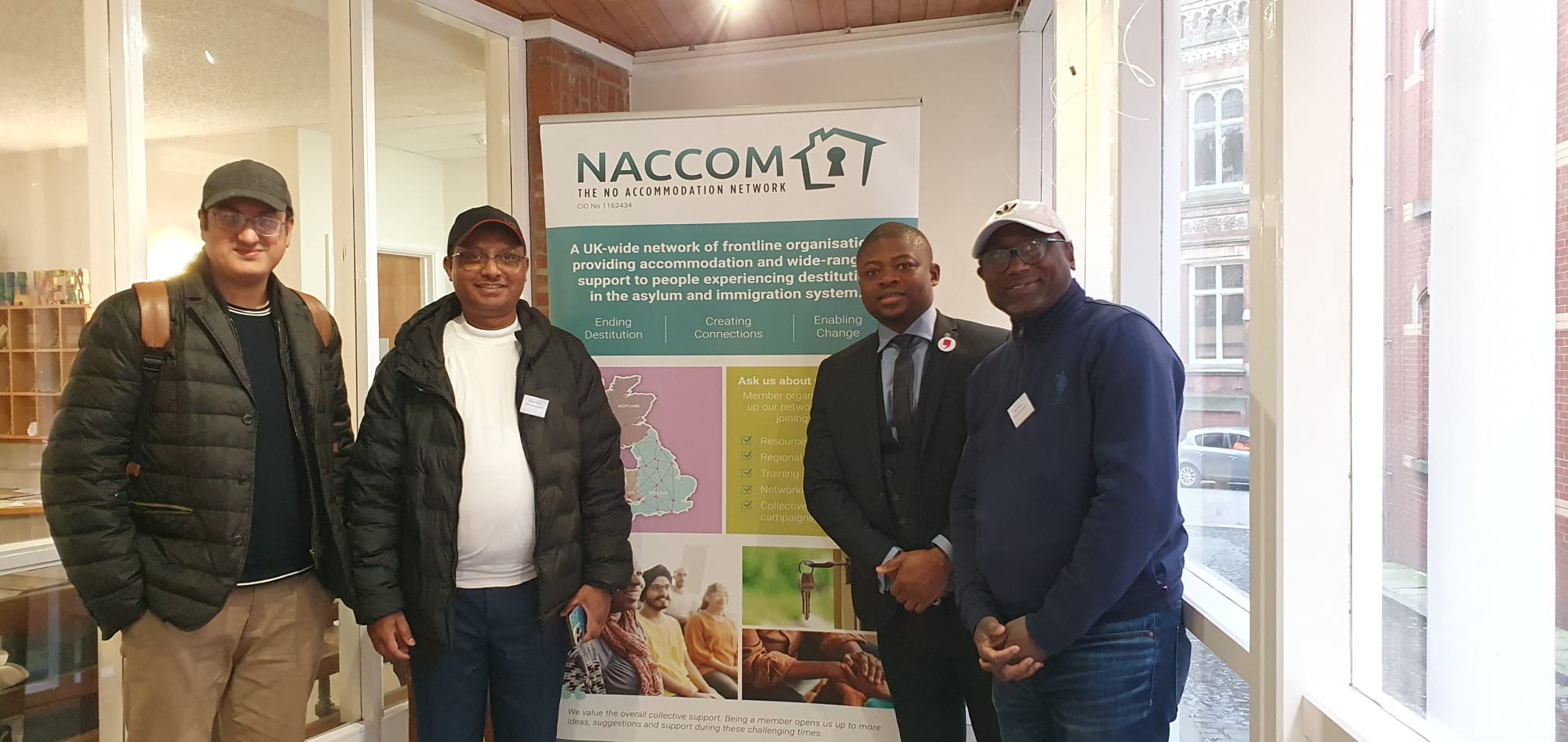Tag: asylum support
Traci Kirkland, Head of Charity at GCP, outlined her message to the new government in our latest newsletter, read below.
“This month we have seen a new UK Government, whose slogan was ‘change’. Here at GCP we really hope that change includes a realistic and compassionate reform to immigration policies, moving away from the hostile environment towards building an inclusive society where everyone’s contributions are recognised, valued and welcomed.
We stand alongside partner agencies we work with in the migration sector and all of our community members to make an appeal to the Prime Minister and his new government to make rebuilding the immigration system one of their big changes. To this end we continue to be part of the Fair Begins Here campaign from Together for Refugees. Polls increasingly show that the majority of the nation see migration and diversity as a huge benefit to our communities and our economy. They agree that the current, dehumanising system is broken beyond repair and does not represent the views of most of the country or how we want other nations to see us.
We were delighted to see the Prime Minister scrapped the inhumane Rwanda scheme on his first days in office. We would now urge the new government to work with and learn from those in the sector, and most importantly, those with lived experience, to co-design a system which is fair and based on humanity. We want to see safe and legal routes for vulnerable individuals and families who seek sanctuary from the social injustices which are happening globally. We would also ask that the government recognises the level of harm and toxicity caused by the use of dehumanising language when talking about migration and takes steps to address this.
“We are way more powerful when we turn to each other and not on each other, when we celebrate our diversity… and together tear down the mighty walls of injustice.” Cynthia McKinney
We ask the government to let people live with choice and dignity, through scrapping policies such as No Recourse to Public Funds, lifting the ban on working for those in the asylum process and scrapping benefit caps which keep families in poverty.
At a local level we bid a fond farewell to our outgoing MP Chris Stephens who stood firmly alongside our community in opposition to hostile immigration policy and thank him for all of his support. We extend a warm welcome to Dr Zubir Ahmed as our new constituency MP in Glasgow South West. We ask Dr Ahmed to stand in solidarity with our community and push his parliamentary colleagues to look beyond the numbers and the reports and truly engage with and listen to people at community level when looking at solutions for the broken immigration system, the ongoing housing crisis and the cost of living crisis.
We live in hope of a new government bringing real, lasting change. A government that believes in cohesion, not division, and we look forward to engaging with our new MP in the near future.”

Govan Community Project will be scaling back the pantry voucher scheme in 2024, due to difficulty in securing sustainable funding.
Going forward, the voucher project will only be available for those:
- on cashless asylum support
- who are destitute
- who have NRPF
The only exception to this is the Courtyard Pantry who will be able to continue covering the cost themselves. Referrals will continue as normal to this pantry.
From June 2024, GCP will be unable to pay the membership for those who are receiving Section 95 asylum support. In those cases, people will need to pay the membership fee themselves.
GCP are still able to offer advice and referrals on how to access the pantries and other food banks, so please continue to get in touch with our Advice & Advocacy team if you need support.
Traci Kirkland, Head of Charity at GCP, said: “We are really devastated to be making this announcement. We have been able to offer this support since 2021 and over the course of the pantry project have been able to refer around 918 individuals or families to the project, providing support for at least 1,400 people.
We believe that the need has not gone away for this support- the cost of living is increasing- therefore despite increases in asylum support rates, it is not sufficient for people to be able to meet their basic needs. Unfortunately, this is an area of support it is challenging to attract funding for.
We would like to thank our pantry partners that we work with and the support that they have provided to our community members. We appreciate them recognising the importance of making the pantry model accessible and welcoming to those seeking sanctuary in the UK.”
If you would like to support the pantry project in it’s scaled back format, you can donate here.

GCP is launching a series of Community Wellbeing Workshops with a focus on mental health literacy. The first workshop is How to Access NHS Services, including information on registering with a GP, accessing an interpreter for appointments and what to do in an emergency.
The workshop will be led by Francine Bucumi from the Asylum Health Bridging Team. Drawing on her personal and professional experience, Francine will talk about the importance of knowing your rights to medical treatment and how to access mental health services within the NHS.
She will also talk about the importance of social activity on the impact of mental wellbeing and share her experience of volunteering.
Topics covered in the workshop include:
- HC2 forms (application and renewal)
- Access to primary and secondary NHS care
- Registering with a GP
- Speaking with a GP about your mental health
- Accessing interpreters for NHS appointments
- Asylum seekers rights within the NHS
- Importance of social activity on wellbeing
- What to do/ where to go in an emergency
The workshop will take place on Thursday 16 May, 1pm-2.30pm at The Barber Suite, Elderpark Housing Association.
All workshops are open to anyone in the community who would like to learn more about mental wellbeing, but the support focus is on refugees and asylum seekers.
Workshops are free to attend, light refreshments will be provided, interpreters and translated materials are available upon request.
You can register by sending your name, contact details and language requirement to wellbeing@govancommunityproject.org.uk.

In March, GCP staff and members of our Ending Destitution Together Group attended the No Accommodation Network (NACCOM) annual conference, which promotes shared learning and good practice amongst members.
The Guardian’s Social Policy Editor, Patrick Butler, was the keynote speaker who talked about the current political and media context surrounding refugee and migration issues. He discussed the important role journalism can play in highlighting injustice and inequality and promoting compassion instead of hostility.
Other speakers included Reneae Mann, from the Refugee Council, Eiri Ohtani from Right to Remain, and Sonia Lenegan, Editor of Free Movement and asylum and public law solicitor. Participants had the opportunity to take part in workshops on themes such as setting up and diversifying housing models, working with people with complex needs, setting up and running lodgings schemes for newly granted refugees , safeguarding support in storytelling and working with the media, influencing in a general election year and building lived experience representation.
Wellbeing was a large feature of the day with all participants enjoying some amazing food and taking part in various mindfulness activities throughout the day.
We asked our group members to tell us the key things they took away from the conference:
● Importance of raising awareness/education
● The power in tackling challenges together
● No one deserves to be homeless, humanity and collaboration is so important
● Planning, mitigation and advocacy are key factors for influencing change
Feedback from our group members on their attendance was very positive and they felt the quality of the keynote speakers was very high.
One group member said: “It was a good experience to attend this kind of conference for the first time outside of Scotland. It was good from a learning point of view, to understand housing issues and case studies. Very practical approaches and we made good relationships with other organisations.”
